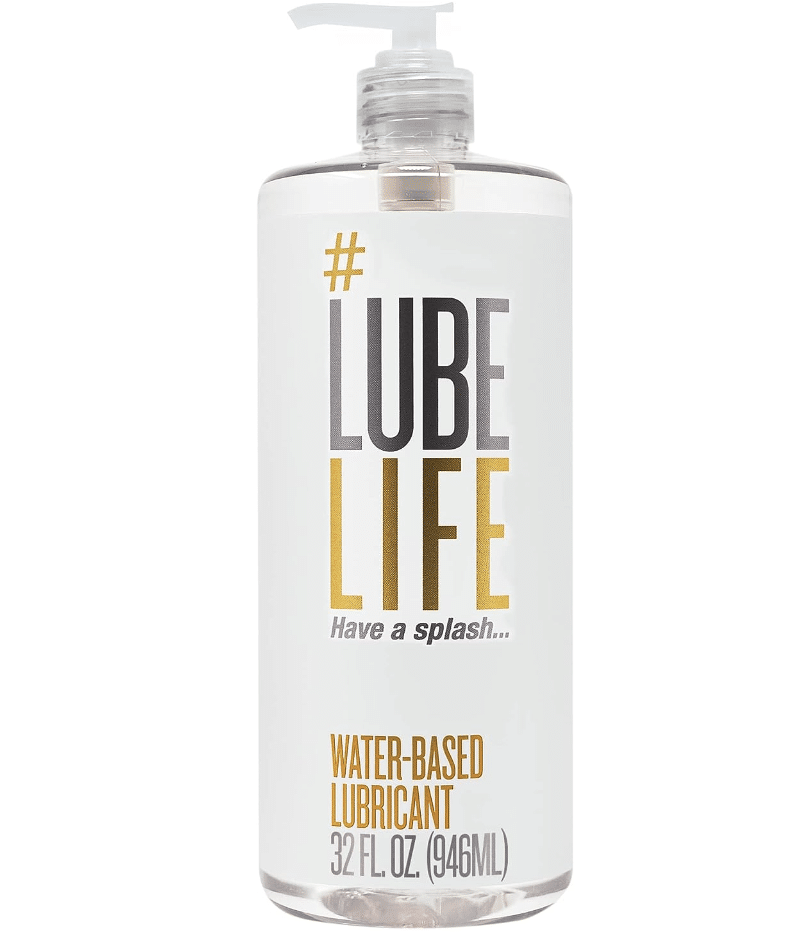We are proud to say that these posts are not sponsored. Our editorial team of Bobbie moms and writers personally select each featured product. If you buy something through our links, we may earn an affiliate commission, at no cost to you.
Bringing a new life into the world is an astonishing, transformative journey that changes every part of your body. And let’s be real, life as a postpartum mom is not always a walk in the park. Whether you were radiating joy through pregnancy or suffering from a cascade of miserable symptoms (or even postpartum anxiety), we get it— you’re ready to feel like yourself again. But when can you safely hit the sheets with your partner? And will sex after having a baby hurt? All valid questions; let’s talk about sex after baby.
If you want to hear some real talk about sex after baby, listen in on the Milk Drunk Podcast, where we talk with your favorite mom friends, Cat & Nat, plus Dr. Rachel Hoffman, sex therapist and Chief Clinical Officer at Real.
When can I have sex after having a baby?
You have most likely been scheduled for a postpartum checkup at six weeks post-delivery. This is usually where you get cleared for activity, including sexual activity. So can you have sex after having a baby before the 6-week mark? Is it normal to want to or not want to?
For some women, the combination of a sore, recovering body, sleep deprivation, and potential body image struggles mean that sex is the farthest thing from their minds. Others may miss sex and feel ready to go! Either feeling is normal. If you are not sure if you are safe to resume sex, it is a good discussion to have with your OBGYN. There are no absolute rules, but most OBGYNs recommend waiting six weeks, whether you had a c-section or delivered vaginally.
Your body has a lot to recover from, and not just the trauma of vaginal tears or a c-section incision. In the days and weeks after birth, your uterus goes through the process of involution– returning to its previous size. It has to shrink from the size of a grapefruit to about the size of a walnut. You will also bleed— for a long time! Some women bleed the entire first six weeks postpartum.
The place your placenta was attached inside your uterus is essentially an open wound that has to close. Placing anything foreign inside your vagina– a tampon, a douche, or a penis– before this healing process has finished can set you up for an infection.
Can I have sex after baby before 6 weeks?
If you are feeling great and want to get back in the bedroom for something other than sleeping, ask yourself a few questions:
- Has it been at least four weeks since you had your baby? It is unlikely for your uterus to have finished involution and be healed before then.
- Did you have a c-section? You should give yourself some extra time before activities, including sex, if you did. A c-section is major surgery. Your body has a lot to recover from with all the post-pregnancy changes combined with post-surgical healing!
- Are you still bleeding? If you have any red bleeding, put on the brakes! Red bleeding means your placenta site is likely still in the process of healing. Once your discharge is pink or white, the site is most likely closed, and you will have less risk of infection.
Every woman has a unique medical history and a unique delivery experience. If you are thinking of resuming sex before your six-week checkup, consider checking with your OBGYN just to be sure it is safe for you.
Pain & sex after baby
So what if sex hurts? It’s the big question you are probably asking yourself, especially if you had any vaginal tearing with your delivery. The truth is that sex can hurt for a number of reasons after childbirth, but fortunately, there are treatments that can make all the difference.
It would make sense to assume that the main reason for painful sex after having a baby would be a healing wound in your perineum. True, a traumatic delivery with tearing and subsequent scar tissue can lead to pain with penetration. But it is not the only cause or even the main reason for painful sex.
So, if sexual pain doesn’t come from the tearing from pushing out a baby, what does it come from?
What causes painful sex after vaginal delivery?
After having a baby, your body goes through many physical and hormonal changes. Lots of these changes can lead to pain with sex. Some of the most common ones are:
- Decreased estrogen. As your body transitions to the non-pregnant state, your hormones shift. This, along with the hormones released with breastfeeding, lead to lower estrogen levels. Low estrogen causes your vagina to be drier and also makes the skin more fragile.
- Scar tissue. An open tear will definitely cause pain with penetration. Once the tears have healed, the scar tissue they leave behind can too.
- Pelvic floor tightness. Your pelvic floor has spent 40 weeks holding up the weight of your uterus. It is very common to have overly tight muscles in it after delivery. This is one of the biggest causes of ongoing sexual and pelvic pain.
- Mental and psychological factors. There are a lot of reasons you may not feel quite like yourself. Your body shape is shifting, and it takes time for it to return to something you recognize. You may be struggling with body image, in addition to exhaustion, stress, anxiety, or full-blown postpartum depression. All of these can make you tense up and cause pain. Fear of sex and the thought that it may hurt can do that, too.
What causes painful sex after a C-section?
If you had a c-section, you may not have had a torn perineum during delivery, but most of the factors that can cause painful sex apply to you, too. No matter how you delivered your baby, you may still struggle with:
- Decreased estrogen
- Pelvic floor tightness
- Mental and psychological factors
Your scar tissue will be in a different location after a c-section delivery, but it is still there. Since the abdomen and abdominal muscles are closely connected to the pelvic floor muscles, abdominal scar tissue from a c-section can make any dysfunction in your pelvic floor muscles worse. In fact, a recent study showed that women who had a c-section were more likely to have pain with sex after delivery than women who delivered vaginally.
How to make sex hurt less after a baby
Fortunately, there are ways to make sex hurt less or not at all. If you are thinking you may as well take a vow of chastity at this point, don’t worry! You do not have to give up on sex.
One of the best things you can do for yourself and your pelvic floor is to see a pelvic floor physical therapist after you have a baby.
“Aside from addressing overactive pelvic floor muscles, pelvic PTs also help reduce perineal scar pain and tightness that may be contributing to pain,” says Katherine Ireland, PT, DPT, WCS, CLT, Board-Certified Specialist in Women’s Health Physical Therapy, at Northwestern Medicine. Ireland offers some valuable insight on resuming intercourse without pain.
“It is best to gradually return to penetrative intimacy, focusing first on reconnecting with your partner and then gradual forms of penetration— such as starting with a finger, then just gently inserting the tip of his penis before resuming full thrusting. This will assist with a positive return to sex postpartum and avoid your body associating sex with pain,” says Ireland.
Lubricants— Can lube help painful sex after baby? Is it safe?
Yes! Because lower levels of estrogen in your body lead to vaginal dryness, a good lubricant can make a big difference in reducing friction.
“All lubricants are not created equally,” Ireland says, “You want to look for a high-quality lubricant that has low osmolarity. Otherwise the lubricant can actually make vaginal dryness worse.”
Best vaginal lubricant
Dr. Jane van Dis, MD, OB/GYN and Bobbie Medical Advisor recommends only using water based lubricants. Here are a few options, but speak to your MD to find out which is safest for you.
Womaness Daily V Soothe Water Based Vaginal Moisturizer

This water-based vaginal moisturizer made from hyaluronic acid is not sticky, it feels very natural. No silicone or soy, no estrogen, phytoestrogen, or added hormones. Feel free to subscribe & save!
K-Y Ultragel Lube, Personal Lubricant, Water-Based Formula
LubeLife Water Based Personal Lubricant

This vegan, water based lubricant formula is made without parabens, glycerin, silicone, gluten and hormones.
(It’s a best seller on Amazon with 140, 000+ reviews, so we’ll let you take that for what it’s worth!)
How do I treat other causes of painful sex?
For other causes of painful sex, start with a conversation with your OBGYN. You may benefit from locally applied estrogen cream to address the hormonal cause of vaginal dryness. If you are struggling with stress, postpartum depression, or anxiety, your doctor may be able to recommend a psychologist or therapist. A sex therapist is another option to help you target and overcome the mental barriers to enjoying sex.
Getting help: Sex therapist or pelvic floor therapist after baby
“Every person after giving birth would benefit from seeing a pelvic floor PT, even if only for an initial assessment to ensure the proper functioning of the pelvic floor and core muscles post-birth,” says Ireland.
If you haven’t heard of a pelvic floor PT, you’re not alone! “I am often told by the clients I see that they didn’t know pelvic floor physical therapy exists,” Ireland says. “Pelvic floor physical therapists are specially trained to treat the muscles of the pelvic floor. We help people with bowel, bladder, and sexual dysfunction that is the result of, or impacted by, the muscles surrounding the pelvic organs— i.e. the pelvic floor muscles.”
What does it mean if my pelvic floor muscles are overactive?
“Most women expect that they will be ‘loose down there’ and worry about weakness issues postpartum, but most don’t know that their pelvic floor muscles may actually become overactive or ‘too tight’ after birth,” says Ireland.
You may need to strengthen your pelvic floor, but “while most women after birth will benefit from strengthening their core and pelvic floor muscles, muscle overactivity must also be addressed— if it is identified— to reduce pain, such as painful sex, and allow successful strengthening,” says Ireland.
Ireland explains, “Pelvic floor muscle overactivity refers to the condition where the muscles of the pelvic floor are holding onto too much tension at rest. I compare this to the familiar ‘knots’ and ‘soreness’ we often feel along her upper back and neck regions.”
When your pelvic floor muscles can not let go of tension, it can make them painful and tender. According to Ireland, “this is often what we find in the muscles of the pelvic floor when someone is experiencing pain with sex, and is VERY common postpartum.”
Do Kegels help after having a baby?
Kegels are traditionally a go-to exercise after having a baby, but unfortunately, you may do yourself more harm than good with them if you start right after delivery.
“Pelvic floor exercises, otherwise known as Kegels, are the opposite of what you want to do if you are having painful sex related to pelvic floor muscle overactivity,” says Ireland. If your pelvic floor muscles are overactive, they need to be stretched and released before you start strengthening exercises. Diaphragmatic breathing, stretches, and yoga-type positions can help relax and bring length to your pelvic muscles.
Because the pattern of muscle tightness is individual to each person, an evaluation with a pelvic floor physical therapist will guide you through what to focus on for each muscle group. Ireland explains that Kegels are great for strengthening after tightness has been released, “particularly if you are experiencing symptoms related to pelvic floor weakness such as prolapse symptoms or bladder/bowel leakage.”
How do you treat overactive pelvic floor muscles to resolve painful sex?
A pelvic floor physical therapist can treat pain that comes from pelvic floor dysfunction through
- Individualized stretches
- Targeted exercise plans
- Manual massage techniques
- Postural education
- Tips and techniques for resuming penetrative activities comfortably
Massage does often include manual release of tight muscles in the pelvic floor through your vagina. It can seem daunting, but the benefits are undeniable. “PT is highly effective in treating painful intercourse related to overactive pelvic floor muscles,” says Ireland.
When should I see a sex therapist?
Sex therapists are licensed and trained to help with psychological barriers to a healthy and fulfilling sex life.
“It is common to struggle with returning to intimacy after giving birth considering your changing role, lack of sleep, and body changes— to name a few ‘unsexy’ variables— but this does need to be normal or expected,” Ireland says. You can also carry over anything you struggled with before pregnancy. A sex therapist can be a great resource for overcoming mental blocks and fears. They use psychotherapy, also called talk therapy, and may use other techniques like Cognitive Behavioral Therapy (CBT), to help you work through unhealthy mental habits.
Postpartum sex FAQs
Can I get pregnant if I am breastfeeding?
Absolutely! Breastfeeding can delay the return of your menstrual cycle, but breastfeeding is not a reliable way to keep from getting pregnant. Your period can come back anytime, whether you breastfeed exclusively or supplement with baby formula. For some women, this can mean you get a year or more without your cycle, and for others, including this lucky author, you may only have a week off after the postpartum bleeding stops.
You will ovulate before your period re-appears. It is quite common to have a surprise subsequent pregnancy soon after giving birth. Because of this, it is crucial to use a reliable birth control method when you start having sex again. Even if you want babies close in age, it is wise to give your body enough time to recover before starting another pregnancy. According to the American College of Gynecologists, you should wait at least six months after delivery before getting pregnant again and wait 18 months for the best outcomes.
Can you have oral sex after having a baby?
Keep in mind that you can bleed for up to six weeks after having a baby. You should avoid oral sex if you have any open wounds or are still at risk of infection with bright red bleeding. Besides those considerations, as long as you and your partner feel comfortable, go for it!
How can I fix low sex drive after having a baby?
Start by spending some quality, no-pressure time with your partner. Re-familiarize yourselves with each other, and set clear expectations about what you need. Use tons of foreplay, giving yourself time to warm up.
As much as it sounds like the opposite of sexy to write down a time in your planner, it can help a lot to schedule intimate time. Don’t rely on it just happening. With a new baby in the house, it is much less likely for the sex stars to align for it to happen spontaneously. Working with a sex therapist can also be a good option if you continue to struggle.
Postpartum Sex
As a new parent, it is natural to experience changes in your body and to feel nervous about sex. Remember that you are not alone in your feelings of uncertainty and that there are many resources available to help you. Whether it’s talking to a healthcare professional, getting a personalized exercise plan from a pelvic floor PT, or trying different lubricants, there’s no “one size fits all” solution. Remember to practice self-care during this new period of adjustment and take the time to find what works best for you and your partner. With the proper support and information, you can come out the other side feeling more sexy and confident than ever before.
Sources:
The physiological basis of Breastfeeding | NCBI Bookshelf
Persistent Pain After Cesarean Delivery and Vaginal Delivery | NIH.gov
Pelvic Pain and Mode of Delivery | NIH.gov
Dyspareunia and childbirth: a prospective cohort study | Wiley Online Library



